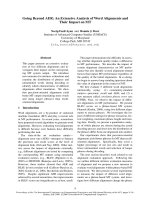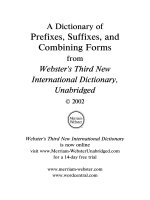Dictionary of word roots and combining forms (1960) borror donald j
Bạn đang xem bản rút gọn của tài liệu. Xem và tải ngay bản đầy đủ của tài liệu tại đây (3.57 MB, 144 trang )
DICTIONARY
of
WORD ROOTS
and
COMBINING FORMS
DICTIONARY
of
WORD ROOTS
and
COMBINING FORMS
Compiled from the Greek, Latin, and other languages,
with special reference to biological terms and scientific names
Donald J . Borror
The Ohio State University
MAYFIELD PUBLISHING COMPANY
First Edition, 1960
Copyright © 1960 by Donald J. Borror
Copyright © 1988. Renewed by Arthur C. Borror
Manufactured in the United States of America
Library of Congress Catalog Card Number 60-15564
Mayfield Publishing Company
1280 Villa Street
Mountain View, California 94041
Preface
One of the outstanding problems of the biologist, whether he be
beginning student or specialist, is that of understanding technical
terms. The best way to understand and remember technical terms
is to understand first their component parts, or roots. To this end
the various word roots, from the Latin, Greek, and other languages,
that are most frequently encountered in biological terms have been
brought together in this dictionary.
Some of the word roots listed in the following pages are used in
many scientific terms and names, and once their meaning is understood their occurrence in words subsequently encountered will immediately suggest the meanings of the new words. The task of looking
up a new word in a technical or unabridged dictionary is often eliminated by a knowledge of word roots. The study of the roots of words
can become extremely interesting, as well as a very valuable aid in
understanding new terms.
This dictionary has been designed primarily to meet the needs of
the beginning student, the medical student, and the taxonomist, but it
should be of value to all biologists. Both student and teacher are
keenly aware of the difficulties of the beginning student in learning
technical terms; the medical student is often overwhelmed by the
multitude of names of structures, conditions, and processes which
he must understand and remember; and the taxonomist frequently
encounters words the meanings of which are to be found only in a
Latin or Greek dictionary, if at all.
The section on the formulation of scientific names, following the
list of word roots, should be of value to the taxonomist who is interested in naming new species or groups.
iii
Table of Contents
Page
Preface
iii
How To Use This Dictionary
1
Dictionary of Word Roots and Combining Forms..
7
Formulation of Scientific Names
Transliteration of Greek Words
Some Common Combining Forms
113
•
116
118
How To Use This Dictionary
Every scientific term or name is composed of one or more word
roots, between and following which may be one or more vowels or consonants. In the list of roots on the following pages, the connecting
vowels and consonants that are most frequently encountered are indicated as variations in the roots. For example, the entry erythr, -o
(G) red indicates that the root is erythr and the most commonly encountered connecting vowel is o, and the root may be found as erythr
or erythro. The source language of each root is indicated by the abbreviation in parentheses (the root erythr is from a Greek word).
Roots preceded by a hyphen are suffixes, or roots generally used
at the end of a word; for example, -idae is the suffix that is added to
the roots of generic names to form the names of families of animals,
and -pus is the Greek root meaning foot that is used at the end of a
word (e.g., octopus). Roots preceded by an equals sign may be used
alone or as a terminal root; for example, =buteo, from the Latin and
meaning a kind of hawk, is used as Buteo, a genus of hawks; and in
the name Archibuteo, another genus of hawks. Root variations preceded
by an equals sign are variations usually used at the end of a word; for
example, in the entry cephal, =a, -o, the ^§_ indicates that cephala is
usually used at the end of a word (as in Acanthocephala, the phylum
of spiny-headed worms, parasitic; also a genus of bugs that have a
spine on the head).
Similar English meanings are separated by commas, and dissimilar meanings by semicolons. Different English meanings of the same
root may be due to the fact that the word from which the root comes
has more than one meaning, or the root may be derived from more
than one word in the source language; some roots may be derived
from words in two source languages, and in such cases the source
language is indicated in connection with each English equivalent.
Variations in roots are listed separately in the alphabetical sequence only if they are separated by more than two intervening roots;
variations that would be separated by only one or two intervening roots
are not repeated in the sequence.
A few examples will serve to illustrate the use of this dictionary.
1
2
Word R o o t s and Combining F o r m s
Micromere. In the following pages will be found:
micr, -o (G) small
mer, =e, -i, -o (G) a part; the thigh
In this case the variations are mer, -mere, meri, and
mero; the-e indicates that mere is usually used at the end of
a term or name. The two English equivalents here are the result of the root coming from two Greek words,
-mere (G) a part
The hyphen before the root indicates that it is usually used
at the end of a term or name.
The first part of the word micromere means small; the last part
means a part; a micromere is thus a small part of something.
Osmoderma eremicola (the scientific name of the hermit flower
beetle). In the following pages will be found:
osm, =a, -i, -o (G) a smell, odor
osmo, -s, -t (G) pushing, thrusting
derm, =a, -ato, -o (G) skin
erem, -i, -o (G) lonely, solitary
col, (L) with, together; (G) colon; limb
col, -a, -i (L) dwell
The osmo part of the genus name might come from either of the
two roots listed but, since this beetle has a rather distinct odor, it
would appear that the first of the two roots (meaning smell or odor)
is the one used; derma means skin. The genus name therefore refers
to the characteristic odor of this insect. The first part of the species
name means lonely or solitary; since cola is indicated as a variation
in the root meaning to dwell, this root is evidently the one used; the
species name thus means living alone (or as a hermit, hence the
common name of the insect).
Pododynia. In the following pages will be found:
pod, -o, =y (G) a foot
odyn, =e, =ia, -o (G) pain
dyn, -am, -amo, -ast (G) be able; power, energy
The first part of the word pododynia obviously comes from a Greek
How To Use T h i s D i c t i o n a r y
3
word meaning foot. Since the first of the other two roots (odyn) in
dicates ^a as terminating vowels, this is obviously the root involved.
Podo is the form of this root usually used, but since it is followed by
another root beginning with o, the final £ of podo is omitted. Pododynia
thus means pain in the foot.
ABBREVIATIONS
Af - African
Ar - Arabic
AS - Anglo-Saxon
Br - Brazilian
Ch - Chilean
Dan - Danish
Ε - English
EI - East Indian
F - French
Far - Faroese
G - Greek
Ger - German
Go - Gothlandic
H - Hindustani
Hb - Hebrew
Ice - Icelandic
It - Italian
L - Latin
LL - Low Latin; Late Latin
Mai - Malayan
Mex - Mexican
ME - Middle English
ML - Middle Latin
My - Mythology
Ν - a proper name
NL - New Latin
OF - Old French
OHG - Old High German
Pg - Portuguese
Pp - Papuan
Ps - Persian
Pv - Peruvian
Rs - Russian
SAm - South American
Sp - Spanish
Sw - Swedish
RULES FOR PRONUNCIATION OF
SCIENTIFIC NAMES
Vowels. All vowels in scientific names are pronounced. Vowels
are generally either long or short, and in the examples which follow
a long vowel sound is indicated by a grave accent (* ) » and short vow
els by an acute accent (') ; e.g., mate, mât, mète, met, bitte, bit, rope,
rôt, cùte, cut, by, symmetry. A vowel at the end of a word has the
long sound, except when it is a_; a final a has an uh sound, as in idea.
The vowel in the final syllable of a word has the short sound, except
es, which is pronounced ease.
Diphthongs. A diphthong consists of two vowels written together
4
Word R o o t s and Combining F o r m s
and pronounced as a single vowel. The diphthongs are ae (pronounced
e), oe (usually pronounced e, rarely e), oi (pronounced as in oil), eu
(pronounced u), ei (pronounced^ ), ai (pronounced à), and au (pronounced as in August).
Consonants. _Ch has the k sound, except in words derived from a
language other than Greek. When c_is followed by ae, e, oe, j_, or y,
it has the soft (s) sound; when it is followed by a, o, oi, or u, it has
the hard (k) sound. When g is followed by ae, e,i, oe, or y, it has the
soft (j_) sound; when it is followed by a, o, oi, or u, it has the hard
sound (as in go). In words beginning with ps_, pt, et, en, gn, or mn,
the initial letter is not pronounced, but when these letters appear together in the middle of a word the first letter is_ pronounced. An χ
at the beginning of a word is pronounced as z, but as ks when it ap
pears elsewhere in a word. When a double _c is followed by i_or y_, it
is pronounced as ks.
Accent. The accented syllable is either the penult or the antepenult
(in very long words there may be a secondary accent on a syllable
near the beginning of the word). The principal rules governing the
syllable accented and the vowel sound (whether long or short) are as
follows:
1. The accent is on the penult syllable in the following cases:
a. When the word contains only two syllables. Ex.: Àpis, Ulmus.
b. When the penult contains a diphthong. Ex.: Hemileùca, Lygaèus,
Nymphaèa, Spiraea.
c. When the vowel in the penult is followed by χ or z. Ex.:
Agromyza, Melospiza, Corixa, Lespedèza, Prodàxus.
d. When the vowel in the penult is long. Whether this vowel is
long or short often depends on the derivation of the word and
the vowel sound in the source language. For example, in words
derived from the Greek μηρός, meaning thigh, the £ is long
(ex.: epimèron, Diapheromèra); while in those derived from
μ^ρος, meaning part, the £ is short (ex.: Heteromera). The
penult vowel is usually long in the following cases:
1) Words derived from Latin past participles and ending in
-ata, -atus, or -atum. Ex.: maculàta. (The penult vowel
How To Use T h i s D i c t i o n a r y
5
is short in such Greek plurals as Echinodérmata.)
2) Latin adjectives ending in -alis. Ex.: orientàlis, verticàlis,
lateralis.
3) Words ending in -ina. Ex.: Sparflna, Glossîna, Hetaerfna.
4) Words ending in -ica. Ex.: Formica, Melîca, Myrmfca,
Fulîca.
5) Words ending in -ana, -anus, or -anum. Ex.: Tabànus,
Porzàna, mexicànum.
6) Words ending in -ura. Ex.: Thysanùra, Xiphosùra, Cîhaetùra.
7) Words ending in -odes or -otes. Ex.: Sabulôdes, Sphecodes,
Hylodes, Epirôtes.
8) Words ending in -ates. Ex.: Aceràtes, Dryobâtes, Hippelàtes.
9) Words ending in -ales. Ex.: the names of plant orders, e.g.,
Graminàles.
10) Words ending in -inae. Ex.: the names of animal subfamilies,
e.g., Papiliomnae.
11) Words ending in -osis. Ex.: pediculosis, trichinosis; there
are a few exceptions in modern usage, e.g., metamorphosis.
12) Words ending in -soma. Ex.: Calosôma, Eriosdma.
13) Words ending in -pogon. Ex.: Andropôgpn, Calopogon.
14) Words ending in -chlora. Ex.: Augochlôra.
15) Words in which the vowel of the penult is u, except when the
u_is followed by h Ex.: Fenùsa, Ctenùcha, Sambùcus. Exceptions: Libéllula, Bétula, Campanula, Sanfcula.
16) When the vowel is followed by z. Ex.: Agromyza, Triôza,
Lespedèza, Ophiorrhlza.
e. When the vowel of the penult is short and followed by two consonants, except a mute followed by\_ or r. Ex.: Pseudococcus,
Chlorélla, Caulophyllum, Vanessa, Chlorotéttix, Coreopsis,
Latrodectus, Lithospermum, Erianthus, Agrostis, Gryllotalpa,
6
Word R o o t s and Combining F o r m s
Rhododendron, Derméstes, Pyromôrpha, Cordulegâster. When
the vowel of the penult is followed by a mute (b, hard c, d, g,
k, p, q,_t, ch, ph, or^h) and j_or r, the accent is on the antepenult; ex.: Geometra, Anabrus, Rânatra, Melânoplus, Rhombolytrum, Stenobothrus.
2. In other cases the accent is on the antepenult.
a. The vowel of the antepenult is long in the following cases:
1) When it is followed by another vowel. Ex.: Epèolus, Sîalis,
Rhodiola, Hepîalus, Keris. This includes the names of animal families which have a vowel immediately preceding the
-idae; ex.: Danàidae, Trupanèidae, Gavîidae, Melôidae,
Grùidae, Stratiomyidae.
2) When it is a_, e, o, or u, followed by a single consonant and
two vowels, the first of which is e, j_, or £. Ex.: Aràneus,
Geranium, Çastànea, Phacèlia, Tèlea, Orthèzia, Nemôbius,
Numènius, Pogonia, Pîcea, Siàlia, Lànius, Conopôdium. This
is the case in the names of plant families (e g., Malvaceae).
3) When it is u_ and followed by a single consonant. Ex.: Linguatùlida, Redùvius, Cordùlia, pellùcidus.
4) When it is a diphthong. Ex.: Clathroneùria, Linotaènia.
b. The vowel of the antepenult is short in other cases. This includes
all animal family names in which the antepenult is followed by a
consonant (except when the vowel is u); ex.: Anâtidae, Trypetidae, Mimidae, Chrysopidae, Agromyzidae. The following names,
and others with similar endings, have the antepenult vowel short:
Heterôcera, Geôcoris, Conocéphalus, Troglodytes, Empfdonax,
Chauliognathus, Pantographa, Chironomus, Mallophaga, Orthoptera, Micropteryx, Chilopoda, Tria'toma, Neurospora, Drosophila, Trichomonas, Melanostoma.
Dictionary of Word Roots and
Combining Forms
acalanth,s -i, =is (G). A goldfinch
acaleph, a (G). A nettle
a (G). Not, without; together
acanth, *a, -o (G). A spine, thorn
aapt, -o (G). Unapproachable,
acanthi, -d, =s (G). A goldfinch
invincible
acar, -in (G). A kind of mite; tiny
ab, -s (L). Off, from, away
acceler (L). Hasten
abact (L). Driven away
accip (L). Seize, accept
abbreviat (L). Shortened
*accipiter (L). A hawk
abdicat (L). Disinherit
accliv (L). Steep, up-hill
abdit (L). Secret, hidden
abdom, =en, -in (L). The abdomen accresc (L). Increase
ace, -o (G). Heal; remedy
aberran (L). Going astray
-aceae (the ending of plant family
abie, =s, -t (L). A fir tree
names)
abject (L). Downcast, spiritless
=acer
(L). Sharp; a maple tree
ablat (L). Weaned, removed
acerb (L). Bitter, sour
ablep, -s (G). Blindness
acerv, =us (L). A heap
ablut (L). Washed, cleansed
acest (G). Healing; remedy
abort, -iv (L). Born prematurely
acestr, =a (G). A darning needle
abr, -o (G). Delicate, dainty,
acet, -o, =um, =yl (L). Vinegar
pretty
=um (L). A vinegar cup
acetabul,
=abramis (G). A kind of fish
ach (G). Ache, pain
abras (L). Rubbed off, scraped off
achen (G). Boor, needy; not gaping
abrot (G). Not edible; divine;
achet, =a, -o (L). Singing, sounding;
splendor
a cicada
abroton (G). A kind of plant
achille
(G My). A character who had
abrupt (L). Broken away from,
a
vulnerable
heel
steep
achly, -o, -s (G). Gloom, darkness
abs (L). Off, from, away
achn, =a (G). Chaff, froth
abscis, -s (L). Cutoff
achr, -oio, -oo, -ost (G). Colorless
absinth, =ium (L). Wormwood
achth, -o, =us (G). A weight, burden
absit (L). Distant
-o, =um (G). Chaff, bran
abstemi (L). Temperate, moderate achyr,
aci, -do, =us (G). A point, barb
abund (L). Overflow
acicul, =a (L). A small needle
abyss, -o (G). Deep, bottomless
acid (L). Sour, sharp
ac (L). To, toward
acin, -i, -o, =us (L). A berry
aca (G). A point; silence; healing acinac,
=es (L). A short sword
7
8
D i c t i o n a r y of Word Roots
ade (G). Enough, abundantly; to be
-acious (E). Abounding in
sated
«acipenser (L). The sturgeon
adelo (G). Unknown, secret
«acis (G). A point, barb
adelph, «us (G). Brother
acli, -d, «s (L). A small javelin
•aden, -o (G). A gland
acm, «a (G). The highest point;
adephag, -o (G). Gluttonous
a point
acmae, -o (G). Flourishing, mature «adeps, adip, -o (L). Fat
«acmon, -o (G). An anvil
adminicul, «or (L). A support, prop
aco (G). A cure, remedy, relief
acoet, «es (G). A bedfellow, spouse adnex (L). Bound to, annexed
adol, -o (G). Genuine, pure
acoluth, -o (G). Following
aconit, «um (L). The monk's-hood adolesc (L). Growing up
acont, -i, «urn, -o (G). A javelin,
adore, «us (L). Grain, spelt
dart
adox,
-o (G). Insignificant; disrepacost, «a (G). Barley
utable
acous, -t (G). Hear; heard
adr, -o (G). thick, stout
acr, «a, -e (G). At the apex
acr, -i (L). Sharp
adran (G). Feeble, listless
acri, -d, «s (G). A locust
adras (L). Shaved, scraped away
acrib, -o (G). Exact
adul, -a (L). Flatter
acrit, -o (G). Confused
adulter (L). Corrupt, pollute
aero (G). Topmost, the tip
acromi, -o, «urn (G). The point of adust (L). Burned, tanned
the shoulder blade
act, «a, -e, -i (G). The beach, sea- ae (see also ai, e, or oe)
aechm, «a, -o (G). A spear
shore
acti, -no, «s (G). A ray, beam
aeci, «a, -di (G). An injury
actit, «es (G). A shore dweller
«es, -i (L). A temple; a dwelling
aed,
actuos (L). Lively, active
aedeag
(NL). The genitals
acu, =s (L). A needle
«aedes (G). Disagreeable
acu, -st (G). Hear; heard
aedoe, -o (G). Regard with reverence;
acule, «us (L). A sting, thorn
the genitals
acumin, -a (L). A point; pointed
«aedon (G). A nightingale
«acus (L). A needle
aeger, -i (LMy). A nymph
«acus (G). A cure, remedy, relief
acust (G). Hear; heard
aegi, -di, «s (L). A shield
acut (L). Sharp
aegial, -o, «us (G). The seashore,
ad (L). To, toward
beach
adama, -nto (G). Unconquerable;
aegith, -o, «us (G). A hedge sparrow
diamond; iron
aegl (G). Shining, splendid
adapi (NL). A rabbit
addict (L). Devoted, compelled
aego (G). A goat
aegr, -o (L). Sick, diseased
aegypt,
«us
(L).
Egypt
aene
aell, «a,
aelur,
aem,
(L).
-a,
-o,
-o
-ato,
«us
Bronze;
(G).
(G).
-o A
(G).
bronze-colored
A
storm,
cat;
Blood
tail-wagging
whirlwind
and Combining Forms
9
agan, -o (G). Mild, gentle
aeno (G). Terrible
agap, =a (G). Brotherly love, charity
aeol (G My). Aeolus, god of the
winds
agaric, «urn (G). A mushroom
aeol, -i, -o (G). Quick-moving,
agast,
-o (G). Wonderful
shifting
agath, -o (G). Good, brave
aep, -i, -y (G). Tall, high
aequa, -bil, -li (L). Equal, level
agau, agav (G). Illustrious, noble
aer, -ar, -e (L). Of copper, money agel, =a (G). A herd
aer, -i, -o (G). The air, atmosagen, -e, -i (G). Unborn, young
phere
«ager
(L). Afield
-aeresis (G). Take
agera (G). Not growing old
aesal, =um (G). A kind of hawk
aesch, -o (G). Shame, ugliness
agglomérat (L). Collected, heaped up
aesch, -r, -ro, -yn (G). Causing
agglutin, -at (L). Glued together
shame; ugly
aggregat (L). Brought together
aescul, =us (L). The Italian oak
agili (L). Agile, nimble
aesio (G). Fortunate, lucky
aesta, =tis (L). The summer heat
agitât (L). Stirred up; quick
aesthem, =a, -ato (G). Sensation,
agla, -i, -o, =us (G). Splendor,
perception
beauty; splendid, brilliant
aesthes, =is (G). A sensation,
agm, =a, -ato, -et (G). A fragment;
perception
a fracture
aesthet (G). Sensitive, perceptive
agm,
*en, -in (L). A stream
aestival (L). Summer
agn, -i, =us (L). A lamb
aet, -o, =us (G). An eagle
aeth, -e (G). Unusual
agn, -o (G). Pure, chaste
aeth, -o (G). Burn; fiery
agnoi, *a (G). Ignorance
aethal, -o, *us (G). Smoke, soot
ago
(L): Drive; (G): Lead; a chief,
aethi (G). Burnt
leader
aethri, =a, -o (G). Open sky, open
agog, =ue (G). Lead, lead away
air
agon, -o (G). An assembly; a conaethusa (G). Burning; a vestibule
test
aeti, =a, -o (G). A cause
•agora (G). A marketplace
aeto; =aetus (G). An eagle
agost, -o (G). The bent arm; an
affini (L). Allied, related
angle
affluen, =s, -t (L). Abundant, rich
ag (L). To, toward
agr, -a (G). Booty
aga (G). Very, very much
agr, -i, -o (L). Afield
agall, -o (G). Adorn
agreiphn, *a (G). A harrow, rake
agalli, -d, »s (G). An iris
agrest, -i (L). In the country, grow=agalma (G). A pleasing gift; a
ing wild
statue
agreu, -o (G). Hunt, pursue
agreu, -s, -t (G). A hunter
agro
agrost,
agri
agri,
living
(L).
(L).
-oin
=es
(G).
the
Afield
Afield
(G).
Wild,
country
A fierce
hunter; a person
10
agrost, «is (G). A grass; a hunter
ai (see also ae, e, or oe)
aichm, «a, -o (Gj. A spear
aidoi, -o (G). Regard with reverence; the genitals
aiet, -o (G). An eagle
aig (G). A goat; a waterfowl
aigeir, -o, «us (G). The black
poplar
aigial, -o, «us (G). The seashore,
beach
aist, -o (G). Unseen
aithyi (G). A sea gull; a diver
«aix (G).
A goat; a waterfowl
«ajaia; sajaja (S Am). The roseate spoonbill
al (L). To, toward
al, =a, -i (L). Awing
alac, =er, -r (L). Quick, active
alao (G). Blind
alat (L). Winged
alaud, =a (L). A lark
alax, «a (NL). Alaska
alb, -i, -id (L). White
album, =en, -in (L). The white
of an egg
ale, -ae (G). Strong; strength
ale, «es, -i (L). An elk
«alca (Ice). An auk
alced, -in, =o (L). A kingfisher
alcim, -o (G). Strong, brave
«alcyon (G). A kingfisher; a
zoophyte
«alector (G). A cock
alectr, -o (G). Unmarried
aleiph (G). Unguent oil
aleo (G). Hot, warm
-ales (the ending of plant order
names)
aleur,
alet, -o(G).
aleth,
-o
-o,(G).
«urnGrinding
True,
(G). Flour,
honest meal
Dictionary of Word Roots
alex,-i (G). Ward off
aleyr, -o (G). Flour, meal
alg, «a, -o (L). Seaweed
alg, -e (L). Cold, coldness
alg, -e, «ia, -o (G). Pain
all (L). Other, another; a wing
alia (G). An assembly
alien, -a (L). Foreign
aliment (L). Nourish; nourishment
-alis (L). Pertaining to
alism, «a (G). Plantain
alkali (Ar). Soda ash, alkali
all, -o(G). Other, another
allact (G). Change, vary
allagm, «a (G). An exchange
allant, -o (G). Sausage
allass, -o (G). Change, vary
allaxi (G). Crosswise
allé (Ice). The dovekie
allelo (G). One another; parallel
alii, «urn (L). Garlic, onion
alio, -io (G). Other, different
alloth (G). Elsewhere
allotr, -io (G). Strange, foreign
alluv, -i (L). Wash against, overflow; a pool
aim (L). Nourishing, refreshing
aln, -or, «us (L). The alder
«aloe (G). A kind of plant
alope, -c, «x (G). A fox
alp, -estr, -in (LN). Mountains
alphit, -o, «urn (G). Barley meal
als (L). Cold
als, -o, «us (G). A grove
alsin, «a (G). Chickweed
alt, -i (L). High, tall
alter (L). Other
altera (L). One after another
althae (G). Heal, cure
aid (L). Higfr, tall
aim (L). Nourished, fattened
altr (L). Other
and C o m b i n i n g F o r m s
11
altri, -c, =x (L). A nurse
amby, -co, *x (G). A cup
ameb, «a, -o (G). Change
aluc, -o (L). An owl
amel (OF). Enamel
alucin, -a (L). Wander in mind,
ament, *um (L). A thong, strap
dream
«amia (G). A kind of fish
alucit, «a (L). A gnat
amie (L). Friendly, kind
alut, »a (L). Leather
amict (L). Wrapped up
alv, -i, »us (L). The belly, womb
amid, -o; amin, =e, -o (N: ammonia),
alve, -ol, =us (L). A cavity, pit,
ammonia
socket
amm, -o, =us (G). Sand
alysc (G). Shun, avoid
=amma, -to (G). A knot
alyss, -o (G). Uneasy, restless
ammon (GMy). African
am, -a, -an, -at (L). Love; lovamn, -o, =us (G). A lamb
ing; loved
amni, *s (L). A river
ama (G). Together
amnio, -n, -t (G). A lamb; a foetal
amabil, -i (L). Lovely
membrane
amaen (L). Charming, pleasant
amoeb, *a, -o (G). Change
amal, -o (G). Soft, tender
amoen (L). Pleasant, charming
amalg (ML). A soft mass
ampel, -o, «us (G). A grape vine
aman, =s, -t (L). Loving
amph, -i, -o (G). Around, on both
amanit (G). A kind of fungus
sides; double
amar (L). Bitter
amphiblestr, «urn (G). A net; a garamar, =a (G). A trench
ment
amaranth (G). Unfading
amarygm, =a, -ato (G). A sparkle, amphibol, -o (G). Uncertain; attacked
on both sides
twinkle
amphor, =a (L). A bottle, flask
amat (L). Loved; a loved one
ample, -et, -x (L). Embrace
amath, -i (G). Stupid, ignorant
ampli (L). Increase; spacious
amath, -o, =us (G). Sand; sandy
«ampulla (L). A flask
amaur, -o (G). Dark, obscure
amput, -a (L). Cutaway, cutoff
amax, -i, -o (G). A wagon, carampy, -c, =x (G). A head band
riage
amydr, -o (G). Dark, dim, faint
ambi (L). Around, surrounding
amygdal, =a, -o (G). An almond
ambig, -u (L). Doubt; doubtful
amyl, -o, =um (G). Starch; a cake
ambit (L). A going around, a circuit
of fine meal
ambl, -y (G). Blunt
an (G). Without, not
amblo, - s , -t (G). Abortion
ana (G). Up, throughout, again
ambo (L). Both
ana (L). The anus
ambros, =ia (G). Food of the
anact, -o (G). A king, chief
anagall, =is (G). A kind of plant
gods; divine, immortal
analog, =ia, =y (G). Proportion
ambul, -acr, -at (L). Walk
anant, -o (G). Uphill, steep
ambust (L). Burned up, consumed,
anapno (G). Breathe again, rest
scorched
12
D i c t i o n a r y of Word Roots
anapt, -o (G). Fasten, hang
anil, -i (L): Of an old woman;
(G): Cruel
anarrhich (G). Climb up
•anas (L). A duck
anim, -a (L). Life, breath
«anassa (G). À queen
animal, -i (L). An animal
anastomos (G). Coming together
anir (G). A man
anat (L). A duck
anis, -o (G). Unequal
•anax (G). A king, chief
ankyl, -o (G). Crooked, bent
anc, «eps, -ipiti (L). Two-headed
ankyr, «a (G). An anchor
anch, -o (G). Strangle
anlag
(Ger). Lie on; a foundation
anchi (G). Near
annal
(L).
Annual
anchyl, -o (G). Crooked, bent
annect
(L).
Bound together
ancill, «a (L). A maid
annel, «us (L). A ring, a little
ancipiti (L). Two-headed
ring
ancistr, «um (G). A fish hook
annu, -a, »s (L). A year
anco, -n (G). The elbow; a bend;
annuen (L). Nodding
a valley
annul (L). A ring
ancor, «a (L). An anchor
ano (G). Up
ancyl, -o (G). Crooked, bent
anomal, -o (G). Uneven, irregular
ancyr, =a (G). An anchor
anomo (G). Without law, lawless
ander, -o, «urn (G). A flower bed
anophel, «es (G). Troublesome
andin (NL). Of the Andes
anopl, -o (G). Unarmed
andr, -o (G). A man
ans, «a (L). A handle
andren, «a (NL). A bee
•anser (L). A goose
anem, -o (G). The wind
ante (L). Before
aneu (G). Without
«antenna (L). A sailyard
anter, -o (NL). Former; before,
aneurysm (G). A widening
in front of
ang, «ea, -i, -io, -o (G). A vessel,
anth, -e, -o, =us (G). A flower;
box, case
brilliancy
angel, -o, «us (G). A messenger;
anthem, «is (G). A flower
an angel
anthra, -c, =x (G). Coal, charcoal;
angin, =a (L). Something choked;
a carbuncle
quinzy
anthren, =a (G). A bee
•angor (L). A strangling; anguish
anthrop, -o, =us (G). A man
angui, »s (L). A snake
«anthus
(G): A flower; (L): A buntanguill, «a (L). An eel
ing, titlark
angul (L). An angle, corner
anti (G). Against, opposite
angust, -i (L). Narrow
antia, -do, «s (G). A tonsil
anhel, -a, -it (L). Puff, pant;
•antiae (L). The forelock
asthma
antillar (NL). Of the Antilles
«anhinga (S Am). The darter or
antiqu (L). Old
snake bird
«antlia (L). A pump
ania (G). Trouble
and Combining F o r m s
13
antr, -o, «urn (G). A cave, cavity
appet, -it (L). Desire
anu, -la (L). A ring
applanat (NL). Flattened
«anus (L). The anus; a ring
apri (L). A wild boar
aort, «a (G). The great artery
apric (L). Exposed to the sun
ap, =ex, -ic (L). The tip, extremity apsi, «s (G). A juncture
ap, -o (G). From, off, away
apsinth, =us (G). Wormwood
apate, -1 (G). Trick', fallacious
apt (L). Fasten, adjust, fix
=aper (L). A wild boar
aqua,
-ri, -tic (L). Water; of water
aper, -i, -t (L). Open, uncovered
aquil, «a (L). An eagle
aper, -o (G). Not mutilated
»
«aquilo, -ni (L). The north wind;
«apex (L). The tip, extremity
northern
aphan, =es (G). Unseen, invisible
arab, -o, =us (G). A rattling
aphe (G). Touch
arabi (L). Arabia, Arabian
aphel, -o (G). Smooth
arach, «is (G). A leguminous plant
arachn, «a, -i, -o (G). A spider;
aphod, -o, «us (G). Departure
a spider web
aphr, -o, «us (G). Foam
arad, -o, =us (G). A rumbling,
aphrodisi (GMy). Sexual desire
rattling
aphrodit (G My). Venus, goddess of arai, -o (G). Thin, weak
love and beauty, born from sea foam arane, «a, -i (L). A spider; a
aphron, -o (G). Silly, foolish
spider web
«aphtha (G). An eruption, ulcer
arat, -i, -or, -r (L). Plow
aphthit, -o (G). Imperishable
«arbor (L). A tree
aphthon, -o (G). Plentiful
arbut, «us (L). The strawberry
tree
aphy, -o (G). Suck
arc,
-i, -o, «us (L). A bow; an arch;
api, -a (L). A bee
a box
apic (L). The apex, summit, tip
arcan (L). Secret, hidden
apic (G). A pear tree
arch, -aeo, -eo (G). Ancient
=apium (L). Celery, parsley
arch, -e, -eg, -i (G). First, beginapi, -o (G). Simple, single
ning
aplat, -o (G). Terrible
arch, -i, -o, «us, «y (G). Chief,
aplys, =ia, -io (G). A sponge; filthi- principal; a ruler; superior
ness
arch, -o, «us (G). The rectum, anus
archae, -o (G). Ancient
apo (G). From, off, away
archeg (G). First, beginning
apoceno (G). Drain
archeo (G). Ancient
apocyn (G). Dogbane
archi (G). First, beginning; chief;
apono (G). Painless, easy
superior; ruler
apophys, «is (G). An offshoot, out- archo (G). Chief, principal; a ruler;
growth
the rectum, anus
«apotheca (G). A storehouse
apparat (L). Prepared; a preparation
append,
age -ic (L). Hang to; an append-
14
Dictionary of Word Roots
«archus (G). Chief, principal; a
arist, -a, -i, -o (L). An awn,
ruler; superior; the rectum,
bristle
anus
arist, -o (G). Best, noblest
-archy (G). Rule
arithm, -o (G). A number
arci, arco (L). A bow, an arc; a box arithm, -et, -o (G). Easily numbered, few
arct, -o, -us (G). A bear
-arium
(L). A place where somearctic (GMy). Northern, arctic
thing is kept
-arctium (L). Burdock
arma, -t (L). Arms; armed
-arcus (L). A bow; an arch; a box
armill, =a (L). A bracelet
arcy, -us (G). A net
arn, -o, -us (G). A lamb
ard, -i, -is (G). A point, arrowaro (G). Plow, cultivate
head, sting
aroli, =um (NL). A roll of cloth
ard, -e, -o (G). Water, irrigate
•aroma, -t (G). Spice, seasoning
arot, -o, -r, -ro (G). Plowing; a
arde, -a (L). A heron
crop
arden (L). Burning
arpact, -es (G). A robber
ardi, -s (G). A point, arrowhead,
arqua, -t (L). A bow, rainbow;
sting
curved
ardm, -o, -us (G). A watering
arrect (L). Steep, upright
place
arrhen, -o (G). Male
ardo (G). Water, irrigate
arrog (L). Assume, appropriate
ars, -is (G). A raising, lifting
ardu (L). Steep, difficult
arsen (G): Male; (L): Arsenic
are, -a (L). A space, ground
artam, -o, *us (G). A butcher
aren, =a, -i (L). Sand
artem, »ia (G). Something suspended; safety
arent (L). Dry, thirsty
areo (L): Dry, thirsty; (G): War- -artemis (GMy). Diana, goddess of
the hunt
like, martial
arteri, -a, -o (G). The windpipe;
areol, -a (L). A little open space
an artery
aresc (L). Dry, thirsty
arthr, -o, -urn (G). A joint; speech
-arethusa (LN). A water fountain
artic, -ul (L). A joint; speech
arg, -o(G). Shining, bright
artio (G). Even in number
argem, -a, -at (G). An ulcer in
arto, -arms (G). A loaf of bread
the eye
arunc, -us (L). The goat's-beard
argemon (G). An herb
arundi, -n (L). A reed
argent, -at, -e (L). Silver; silvery arv, -al, -ens, -urn (L). Afield
-ary (L). A place where something
argi, -a (G). Idleness, leisure
is kept
argill, -o, -us (G). White clay
ary ten, -a (G). A ladle; a pitcher
argo (G). Shining, bright
asbol, -o, -us (G). Soot
argyr, -o, =us (G). Silver
ari (G). Much; very; warlike
arid(L).
arie,
arill (NL).
=s, -tDry
(L).
A wrapper
A ram
and Combining Forms
15
asc, -i, -o, =us (G). A bag, bladastrap, =a, -e (G). Lightning
der
astring (L). Bind together, fasten
ascalaph, *us (G). An owl
ascari, *s (G). An intestinal worm astro (G). A star
«astur (L). A hawk
asce, -t (G). Practice; curiously
astut (L). Skilled, cunning
wrought
ascend (L). Climb, mount up
atalant, -o (G). Equal to
asci (G). A bag, bladder
atav (L). An ancestor
asci, «a (L). A hatchet
«ater (L). Black
ascid, -i, =ium (G). A little bag
•ather, -o (G). The beard of an
ascio (G). Without shade
ear of corn
asclepi, *us (GMy). Aesculapius,
athet, -o (G). Useless, set aside
god of medicine
athl, -o, =um (G). A prize; a conasco (G). A bag, bladder
test for a prize
asell, *us (L). A little ass
athlet (G). A combatant, prize
asem, -i, -o (G). Obscure, infighter
distinct
atla, -nt, -nto, =s (G My). A giant
asil, =us (L). A gadfly, horsefly
bearing up the pillars of heaven;
asin, =us (L). An ass, simpleton
the atlas bone
asine (G). Harmless, unharmed
atloid, -o (G My). A giant bearing
«asio (L). An owl
up the pillars of heaven; the atlas
aspala (G). A mole
bone
aspalath, =us (G). A sweetatm, -i, -ido, -o, =us (G). Smoke,
scented shrub
vapor
asparag, =us (G). Asparagus
atop,
-o (G). Out of place
asper (L). Rough
atr, -i (L). Black
asperg (L). Scatter, sprinkle
aspers (L). Scattered, sprinkled
atrament, =um (L). Ink; inky
aspi, -d, *s (G): A shield; (L): An atrat (L). Clothed in black
adder, viper
atri, =um (L). A vestibule; black
aspr (L). Rough
atro, -c, *x (L). Hideous, terrible,
aspre, -d, -t (L). Roughness;
cruel
a rough place
attac, =us (G). A kind of locust
assul, »a (L). A splinter
astac, -o, =us (G). A lobster
attagen, =is (L). A snipe; a grouse
=aster, -o (G). A star
attelab, »us (G). A wingless locust
«astes (G). A singer
atténuât (L). Thin, weak
asthen (G). Weak, feeble
»asthma, -t (G). Panting, gasping
au (G). Besides
astr, -o, =um (G). A star
auant (G). Wasted, atrophied
astragal, -o «us (G). The ankle
auchen, -o, =us (G). The neck,
bone; dice
throat
auchm, -o (G). Drought
auctumn, -i, *us (L).
author;
Autumn
abundant









